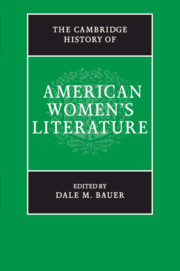Book contents
- Frontmatter
- Contents
- List of illustrations
- Acknowledgements
- Notes on contributors
- Introduction
- 1 The stories we tell: American Indian women's writing and the persistence of tradition
- 2 Women writers and war
- 3 American women's writing in the colonial period
- 4 Religion, sensibility, and sympathy
- 5 Women's writing of the Revolutionary era
- 6 Women writers and the early US novel
- 7 Women in literary culture during the long nineteenth century
- 8 Moral authority as literary property in mid-nineteenth-century print culture
- 9 The shape of Catharine Sedgwick's career
- 10 Writing, authorship, and genius: literary women and modes of literary production
- 11 Nineteenth-century American women's poetry: past and prospects
- 12 Transatlantic sympathies and nineteenth-century women's writing
- 13 Nineteenth-century African American women writers
- 14 Local knowledge and women's regional writing
- 15 Women and children first: female writers of American children's literature
- 16 US suffrage literature
- 17 American women playwrights
- 18 Turn-of-the-twentieth-century transitions: women on the edge of tomorrow
- 19 Accidents, agency, and American literary naturalism
- 20 The geography of ladyhood: racializing the novel of manners
- 21 Self-made women: novelists of the 1920s
- 22 Recovering the legacy of Zara Wright and the twentieth-century black woman writer
- 23 Jewish American women writers
- 24 Women on the breadlines
- 25 Modern domestic realism in America, 1950–1970
- 26 Lyric, gender, and subjectivity in modern and contemporary women's poetry
- 27 Contemporary American women's writing: women and violence
- 28 Asian American women's literature and the promise of committed art
- 29 Straight sex, queer text: American women novelists
- 30 Latina writers and the usable past
- 31 Where is she? Women/access/rhetoric
- 32 Reading women in America
- Index
- References
17 - American women playwrights
Published online by Cambridge University Press: 28 September 2012
- Frontmatter
- Contents
- List of illustrations
- Acknowledgements
- Notes on contributors
- Introduction
- 1 The stories we tell: American Indian women's writing and the persistence of tradition
- 2 Women writers and war
- 3 American women's writing in the colonial period
- 4 Religion, sensibility, and sympathy
- 5 Women's writing of the Revolutionary era
- 6 Women writers and the early US novel
- 7 Women in literary culture during the long nineteenth century
- 8 Moral authority as literary property in mid-nineteenth-century print culture
- 9 The shape of Catharine Sedgwick's career
- 10 Writing, authorship, and genius: literary women and modes of literary production
- 11 Nineteenth-century American women's poetry: past and prospects
- 12 Transatlantic sympathies and nineteenth-century women's writing
- 13 Nineteenth-century African American women writers
- 14 Local knowledge and women's regional writing
- 15 Women and children first: female writers of American children's literature
- 16 US suffrage literature
- 17 American women playwrights
- 18 Turn-of-the-twentieth-century transitions: women on the edge of tomorrow
- 19 Accidents, agency, and American literary naturalism
- 20 The geography of ladyhood: racializing the novel of manners
- 21 Self-made women: novelists of the 1920s
- 22 Recovering the legacy of Zara Wright and the twentieth-century black woman writer
- 23 Jewish American women writers
- 24 Women on the breadlines
- 25 Modern domestic realism in America, 1950–1970
- 26 Lyric, gender, and subjectivity in modern and contemporary women's poetry
- 27 Contemporary American women's writing: women and violence
- 28 Asian American women's literature and the promise of committed art
- 29 Straight sex, queer text: American women novelists
- 30 Latina writers and the usable past
- 31 Where is she? Women/access/rhetoric
- 32 Reading women in America
- Index
- References
Summary
The standard historical narrative of American drama and theater tends to privilege male writers even more than the narratives of fiction or poetry do. In the historical narrative, the important aesthetic developments and cultural moments tend to be linked to the careers of playwrights, almost exclusively male, who have achieved fame, fortune, and critical acclaim, principally in the last 100 years. Thus Eugene O’Neill is linked with early realism and modernism; Clifford Odets with the leftist theater of the 1930s; Tennessee Williams with post-World War II psychological realism; Arthur Miller with politically minded realism; Edward Albee with absurdist drama; Sam Shepard with hyperrealism and postmodernism; David Mamet with a tough dialogic realism characterized by the pseudonymous “Mametspeak”; Tony Kushner with an open, epic theater that addresses issues of politics, identity, and religious myth; August Wilson with African American history, myth, and identity. A similar list of female writers and their cultural moments might include Rachel Crothers with the social realism of the Progressive Era and the society comedy of the Jazz Age; Susan Glaspell with feminist realism and modernism; Lillian Hellman with the social melodrama of the 1930s and ’40s; Lorraine Hansberry with the social realism of the Civil Rights movement; Adrienne Kennedy and Alice Childress with experimental hybrid dramatic forms in the 1950s and ’60s; Mar´ıa Irene Forn´es, Ntozake Shange, and Megan Terry with feminist experiments in the 1970s; Marsha Norman, Wendy Wasserstein, and Beth Henley with a neo-realism that emphasizes women’s issues in the 1970s and ’80s; and, into the twenty-first century, Paula Vogel with an open dramatic form and a focus on family, gender, and identity; Suzan-Lori Parks with remaking both dramatic structure and American history and myth; Anna Deavere Smith and Eve Ensler with a new, socially aware monologic theater.
- Type
- Chapter
- Information
- The Cambridge History of American Women's Literature , pp. 352 - 368Publisher: Cambridge University PressPrint publication year: 2012
References
- 42
- Cited by



